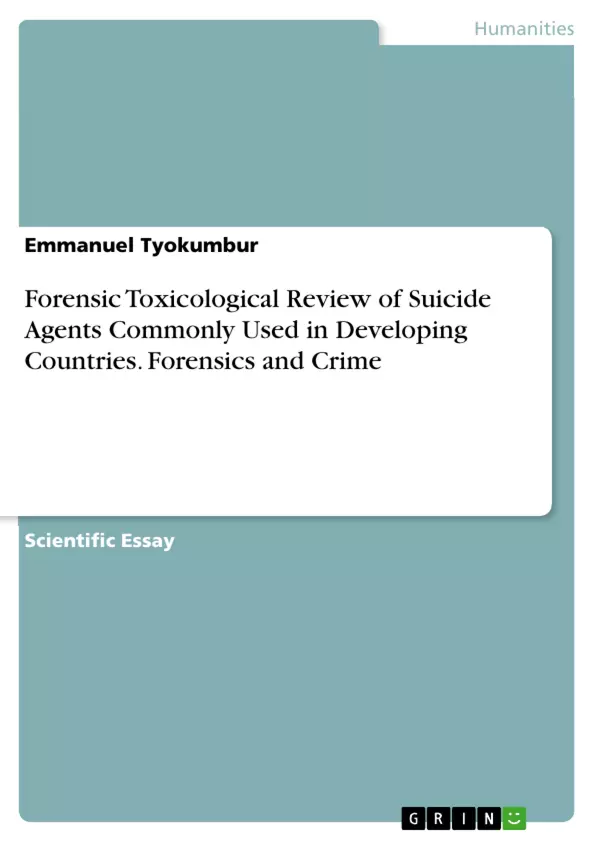A review essay is written on the forensic toxicology of selected suicide agents commonly used in developing countries. The essay discusses suicide, it causes and agents used to commit suicide. Four commonly used suicide agents in developing countries namely sniper, laundry bleaching agents, paraquat and gammalin are discussed under the headings: chemical composition, toxicity in animals and man, uses, regulations and control. The essay concludes on the need to regulate these suicide agents.
Suicide is death caused by injuring oneself with the intent to die. A suicide attempt is when someone harms themselves with any intent to end their life, but they do not die as a result of their actions. Many factors can increase the risk for suicide or protect against it. Suicide is connected to other forms of injury and violence. For example, people who have experienced violence, including child abuse, bullying, or sexual violence have a higher suicide risk.
Globally, approximately one million people kill themselves every year. The World Health Organization (WHO) has declared suicide a major global public health problem and called on member states to devise and implement national suicide prevention strategies. While suicide prevention is receiving increased attention in many developed countries, it remains largely ignored in developing countries, where a number of factors impede the implementation of successful preventive programmes.
The issue of whether suicide can be a good death was separated into two different questions: (1) can suicide be an appropriate death, and (2) can suicide be a rational death? Several definitions of an "appropriate" death were proposed, and suicide was seen as potentially appropriate. Similarly, several criteria for rationality were proposed and suicide was seen as sometimes meeting these criteria. Thus, suicide can be sometimes conceptualized as a "good" death.
Inhaltsverzeichnis (Table of Contents)
- CHAPTER ONE
- 1.1 SUICIDE AGENTS.
- 1.2 DEMOGRAPICS OF SUICIDE AGENTS USE
- 1.3 EXAMPLES OF SUICIDAL AGENTS.
- 1.4 DEVELOPING COUNTRIES
- CHAPTER TWO.
- 2.1 SNIPER
- 2.2 Chemical Composition .........
- 2.3 Toxicity
- 2.4 Uses ........
- 2.5 Regulations...
- CHAPTER 3
- 3.1 PARAQUAT.
- 3.2 Laundry bleaching agents.......
- CHAPTER FOUR...
- 4.1 GAMMALIN-20.
- 4.2 Chemical composition....
- 4.3 Uses ...........
- 4.4 Toxicity.
- 4.5 Regulations.
- CHAPTER FIVE
- CONCLUSION.
Zielsetzung und Themenschwerpunkte (Objectives and Key Themes)
This essay aims to provide a forensic toxicological review of common suicide agents used in developing countries. The work explores the characteristics and effects of specific substances, including their chemical composition, toxicity, uses, and relevant regulations.
- Forensic Toxicology of Suicide Agents
- Common Suicide Agents in Developing Countries
- Chemical Properties and Toxicity of Suicide Agents
- Regulations and Control of Suicide Agents
- Public Health Implications of Suicide Agent Use
Zusammenfassung der Kapitel (Chapter Summaries)
Chapter One introduces the concept of suicide agents, exploring the demographics of their use and providing examples of commonly employed substances. It focuses on the context of developing countries and the prevalence of suicide in these regions. Chapter Two delves into the specifics of Sniper, a common suicide agent, examining its chemical composition, toxicity, uses, and regulatory frameworks. Chapter Three discusses Paraquat and laundry bleaching agents, providing insights into their toxic properties and the consequences of their misuse. Chapter Four focuses on Gammalin-20, analyzing its chemical composition, uses, toxicity, and regulatory guidelines. While the essay concludes with a chapter on the overall findings and recommendations, these are not included in this preview to avoid spoilers.
Schlüsselwörter (Keywords)
This work centers around key concepts like forensic toxicology, suicide agents, developing countries, chemical composition, toxicity, uses, regulations, and public health. It specifically explores the properties and consequences of agents like Sniper, Paraquat, laundry bleaching agents, and Gammalin-20. The focus on developing countries highlights the unique challenges and vulnerabilities associated with suicide prevention in these regions.
- Quote paper
- Emmanuel Tyokumbur (Author), 2023, Forensic Toxicological Review of Suicide Agents Commonly Used in Developing Countries. Forensics and Crime, Munich, GRIN Verlag, https://www.hausarbeiten.de/document/1380048


